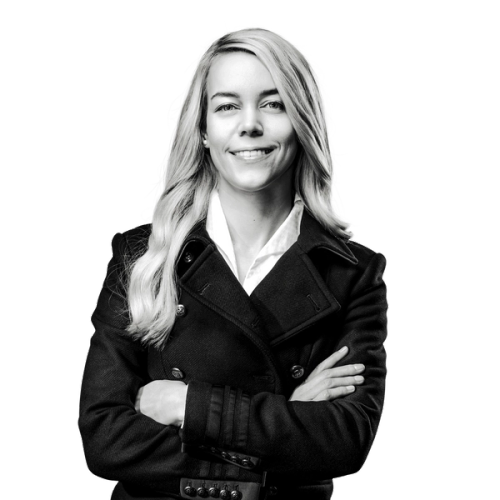What added value does blockchain technology bring for your company?
March 18, 2021
- New Insight

Frankfurt/Main, 18.03.2021. So far, only 3% of medium-sized (family) companies use blockchain technologies. This was the result of a study of 1,444 German companies on behalf of the management consultancy FTI-Andersch. The reason: ignorance, complex implementation and a lack of existing solutions. Professor Gilbert Fridgen, holder of the PayPal chair at the University of Luxembourg and founder of the Fraunhofer Blockchain Labor s, and Dorothée Fritsch, blockchain expert from FTI-Andersch, give an assessment for relevant key industries: logistics, consumer goods, automotive, mechanical engineering and energy. Where does Germany stand - and what are the opportunities today?
Logistics / maturity level: grade 5/5
Most important challenge: complexity of implementation
Biggest strength: maturity of available blockchain solutions
"In no other industry are blockchain applications as well developed as in logistics," says Prof. Dr. Gilbert Fridgen. “This is because the branch is probably the strongest digitized industry in the world today. There has always been the challenge of coordinating a large number of actors without having central contact points. These challenges also make them very interesting for the blockchain. ”However, coordination is still often done on paper today. The logistics partners involved note the information they consider relevant to the transfer to the next actor on the forms. "This mess of paper is by no means forgery-proof and, apart from willful manipulation, very error-prone," says Dorothée Fritsch, blockchain expert at FTI-Andersch. “From a technical point of view, it is a complex optimization problem for which the blockchain appears to be made: the progress in transport is documented decentrally, step by step, in a forgery-proof manner. There are already a large number of well-developed solutions on the market that are used. In the medium term, blockchain documentation will become the gold standard for logistics and supply chain management. "
Consumer goods / maturity: grade 4/5
Most important challenge: supplier market very intransparent
Biggest strength: No relevant blockchain alternatives
The advantages for the consumer goods and food industry are obvious: Seamless traceability of the quality of sensitive products right down to individual ingredients that are purchased and processed worldwide. Gilbert Fridgen says: “The relevance of blockchain is given solely by the fact that the consumer goods industry has not yet succeeded in establishing really functioning quality assurance systems. Many therefore see the opportunity to not only be able to give the customer a verifiable promise of quality in the future with a one hundred percent safe and technically comparatively simple process - but also to reduce process costs. However, the provider market for blockchain solutions is very opaque and therefore prone to abuse. That keeps many, especially medium-sized, players from delving deeper into the topic. ”“ Over half of the German consumer goods manufacturers feel they are not sufficiently informed about the blockchain offer, ”says Dorothée Fritsch. “It is the job of analysts and consultants to create transparency here and to evaluate the available solutions in order to separate the wheat from the chaff. Medium-sized companies in particular often neither want to rely on solutions from international corporations, nor on unknown 'brands'. Here they often need support from third parties, as they cannot carry out the assessments themselves in this depth in terms of technology, content and economy.
Automotive / Maturity: 4/5
Key challenge: Address blockchain in parallel with other major industry challenges
Greatest strength: Immense pressure from the market to innovate
Dorothée Fritsch says: “Hardly any other industry is facing such a comprehensive transformation as the automotive industry. The focus there is on the topics of electrification and CO2 - although blockchain is on the radar, it is much lower on the list of priorities for many. It would be advisable to implement the topic at the same time as changing the drive architecture - in order to develop really new products from a single source. "" An exciting field of application for blockchain is the topic of 'car security', "says Gilbert Fridgen. “For example, an absolutely secure key could be transferred virtually to a third party who is temporarily moving the vehicle. The vehicle data can also be saved forgery-proof: changes in mileage during recycling are a thing of the past. Blockchain applications are already being used, for example, in the area of automated payments for public parking spaces. Automobile manufacturers and suppliers should now evaluate such opportunities at an early stage in order to do justice to the pressure to innovate in their industry. "
Mechanical engineering / Maturity: 3/5
Most important challenge: solutions often not yet developed far enough - because the immediate incentive has been lacking so far
Biggest strength: There is no sufficient supply of alternative solutions
“In German mechanical engineering, the blockchain has so far played almost no role in practice,” says Gilbert Fridgen. The reason: Although many machines now also work digitally, they are still a long way from being 'smart'. “A lot of manual work is still required to operate the machines. A first generation of really 'smart' production systems is mostly still in development. In the future, the blockchain will allow their activities to be logged in a manipulation-resistant manner. ”Dorothée Fritsch says:“ In most cases, companies are still buying their production facilities today and then writing them off. The 'Rent a machine' model is still in its infancy. If this becomes more prevalent, blockchain technologies can not only ensure logging, but also clean billing. ”“ You have to admit that a topic of trust like in logistics or the consumer goods industry does not exist in German mechanical engineering today, ”says Gilbert Fridgen. “Anyone who buys a machine there puts a lot of trust in the respective manufacturer. Accordingly, not enough applications have been developed with blockchain technology to date that could have helped it achieve a kind of breakthrough here. We estimate that further changes in the industry will be necessary before blockchain will play an essential role. "
Energy / Maturity: 2/5
Most important challenge: Regulation makes applications in Germany and Europe almost impossible
Greatest strength: As an export technology to less regulated and developed markets, a product that China or the USA do not offer in this way.
“It is an attractive idea to be able to sell electricity directly to a third party safely and automatically with your own photovoltaic system,” says Gilbert Fridgen. “However, the fact is: the technical possibilities are there. But the regulatory framework does not allow it in the western, highly developed energy markets. That is why blockchain has so far hardly played a role in the energy sector in Germany. ”“ However, it gets exciting when you look at less developed markets without energy oligopolies, such as in many African countries, ”says Dorothée Fritsch. “It was not possible there to develop a central infrastructure for the secure supply of energy. Here in particular, peer-2-peer processes, i.e. direct trade between two private individuals, could really be worthwhile. German companies should check what export opportunities this will open up for them. Because blockchain is above all a European technology with the idea of decentralized data security. That fits neither with the centrally organized China, nor with the platform economy of California. That is why the German economy should seize the opportunity today to develop business in the less regulated markets. "
- - - - - - - - - - - - - - - -
About the investigation:
The study 'Maturity of Blockchain Technology in German Key Industries: 5 Case Studies from German SMEs' is a collaboration of the Paypal -FNR PEARL Chair (holder: Prof. Dr. Gilbert Fridgen) and the consultancy FTI - Andersch. The complete data as well as the illustration of application examples can be downloaded here:
(German)
About FTI-Andersch:
FTI-Andersch is a management consultancy that supports its clients in the development and implementation of sustainable future/performance and restructuring concepts. FTI-Andersch actively supports companies, that have to deal with operational or financial challenges - or want to align their business model, organisation and processes for the future at an early stage.
The clients include in particular medium-sized companies and groups that operate internationally. FTI-Andersch is part of the internationally operating FTI- Consulting- Group (NYSE: FCN) with more than 5,500 employees I.
Your Contacts
 Dorothée Fritsch
Dorothée FritschHead of Business Development & Strategy